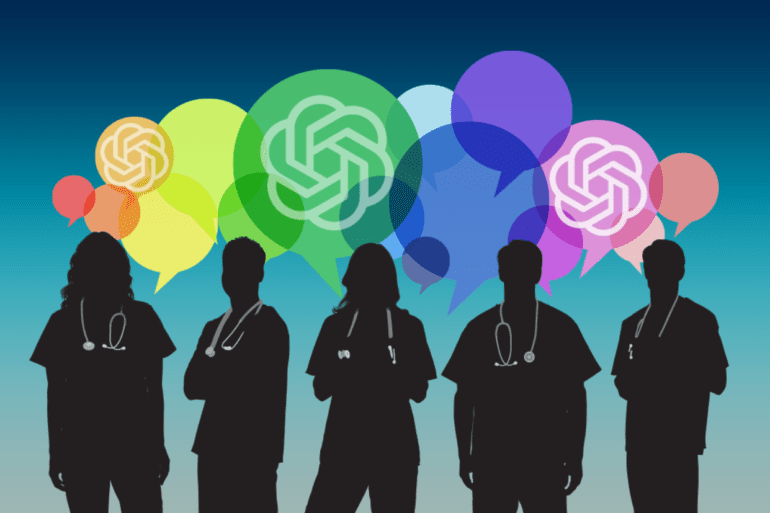TL;DR:
- Beth Israel Deaconess Medical Center (BIDMC) conducted an experiment to test Chat-GPT 4, a generative AI chatbot, in diagnosing complex medical cases.
- The AI chatbot demonstrated impressive accuracy, correctly identifying the top diagnosis in nearly 40% of cases and including the correct diagnosis in its list of potential conditions in two-thirds of challenging cases.
- Generative AI, such as chatbots, has the potential to transform creative industries, education, and customer service.
- The study utilized clinicopathological case conferences (CPCs) to assess the chatbot’s diagnostic skills.
- While chatbots cannot replace trained medical professionals, generative AI can serve as a valuable adjunct to human cognition in diagnosis, aiding physicians in understanding complex medical data and enhancing diagnostic thinking.
- Further research is needed to explore optimal uses, benefits, limitations, and privacy concerns associated with generative AI technology in the clinical setting.
Main AI News:
Cutting-edge research conducted at Beth Israel Deaconess Medical Center (BIDMC) has shed light on the exceptional diagnostic capabilities of Chat-GPT 4, an advanced generative AI chatbot. Published in JAMA, this study delves into the chatbot’s astounding performance when faced with complex medical scenarios.
Generative AI, a branch of artificial intelligence, utilizes patterns and training data to generate novel content, surpassing conventional data processing and analysis. Chatbots, widely recognized examples of generative AI, leverage natural language processing (NLP) to understand, interpret, and produce human-like language. These powerful tools have the potential to revolutionize various sectors, including creative industries, education, and customer service.
Nevertheless, their application in the clinical realm, particularly in intricate diagnostic reasoning, has remained relatively unexplored. Dr. Adam Rodman, co-director of the Innovations in Media and Education Delivery (iMED) Initiative at BIDMC and an esteemed instructor in medicine at Harvard Medical School, explains, “Recent advances in artificial intelligence have led to generative AI models that are capable of detailed text-based responses that score highly in standardized medical examinations. We wanted to know if such a generative model could ‘think’ like a doctor, so we asked one to solve standardized complex diagnostic cases used for educational purposes. It did really, really well.”
To evaluate the diagnostic prowess of the chatbot, Dr. Rodman and his team employed clinicopathological case conferences (CPCs). These conferences entail challenging patient cases featuring pertinent clinical and laboratory data, imaging studies, and histopathological findings, as published in the esteemed New England Journal of Medicine for educational purposes.
Remarkably, the AI chatbot accurately matched the final CPC diagnosis in an impressive 39 percent (27 out of 70) of cases. In an even more impressive feat, in 64 percent of the cases, the AI’s differential—a comprehensive list of potential conditions based on a patient’s symptoms, medical history, clinical findings, and lab or imaging results—included the final CPC diagnosis.
While it is crucial to note that chatbots cannot replace the expertise and knowledge of trained medical professionals, generative AI presents a promising supplementary tool for diagnostic decision-making. Dr. Zahir Kanjee, a hospitalist at BIDMC and assistant professor of medicine at Harvard Medical School, emphasizes, “It has the potential to help physicians make sense of complex medical data and broaden or refine our diagnostic thinking. We need more research on the optimal uses, benefits, and limitations of this technology, along with addressing privacy concerns. Nevertheless, these exciting findings pave the way for the future of diagnosis and patient care.”
Co-author Dr. Byron Crowe, an internal medicine physician at BIDMC and an esteemed instructor in medicine at Harvard Medical School, echoes the sentiment, stating, “Our study contributes to the growing body of literature that demonstrates the promising capabilities of AI technology. Further investigation will provide deeper insights into how these new AI models might transform the delivery of healthcare.”
It is worth mentioning that this research received no separate funding or sponsorship. Dr. Kanjee discloses receiving royalties for edited books and being a member of a paid advisory board for medical education products unrelated to artificial intelligence, courtesy of Wolters Kluwer. Additionally, Dr. Kanjee receives honoraria for delivering CME from Oakstone Publishing. Dr. Crowe reports employment by Solera Health outside the submitted work. Dr. Rodman has no conflicts of interest to declare.
Conclusion:
The exceptional performance of ChatGPT AI in challenging medical cases signifies a groundbreaking advancement in the field of medical diagnoses. This technology has the potential to revolutionize healthcare delivery by assisting physicians in complex diagnostic reasoning, broadening their understanding of medical data, and refining diagnostic thinking. As generative AI continues to evolve, it opens up new opportunities for innovation and improvement in various industries, particularly in the realm of patient care. Market players should closely monitor these developments and explore potential applications to stay at the forefront of this transformative technology.

